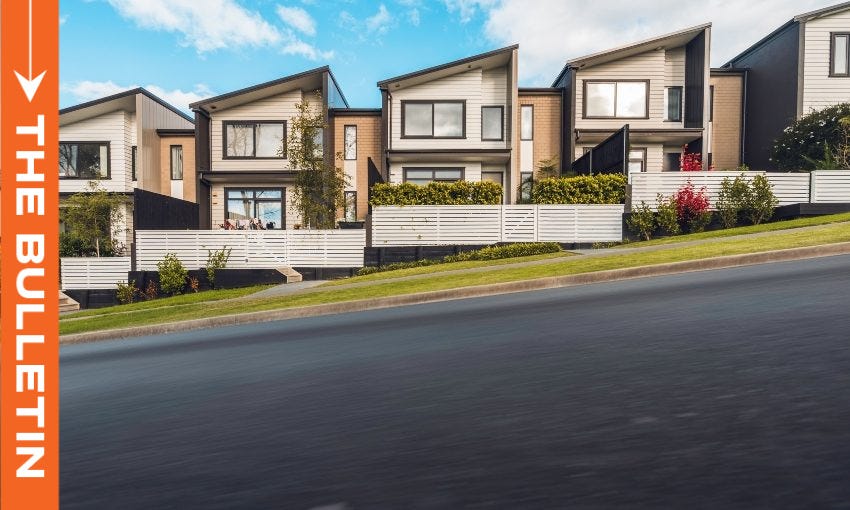Is an 'affordable' first home finally in sight?
Lower prices, dropping interest rates and looser mortgage regulations are helping young buyers to enter the market.
Mōrena, and welcome to The Bulletin for Wednesday, July 31.
In today’s edition: Māori wards to again be subject to voter referendum; Christchurch housing panel rejects council’s sunlight concerns; Air NZ abandons its 2030 carbon emissions goal. But first, for many, this might be the best opportunity to buy a first home in years.
‘Overly prescriptive’ loan checks on the scrapheap
While wage-earners are celebrating the arrival of tax cuts, however small they may be, prospective first-home buyers have been handed another small victory. From today, strict loan affordability regulations are gone from the Credit Contracts and Consumer Finance Act (CCCFA), ending the spending checks that caused such an uproar when they were announced in December 2021. While the government is trumpeting its slashing of 11 pages of arduous, “overly prescriptive” checks, the regulations had already been eased significantly by the previous government in response to the outcry. Still, housing minister Chris Bishop says the change will put an end to “the immense stress caused by the screeds of information and disclosures” that first-home buyers had to provide under the old rules.
It’s likely that the impact will actually be most felt by non-mortgage borrowers, as the costs of compliance was having a “chilling effect” on lenders’ ability to offer smaller sums of up to $5,000, according to commerce and consumer affairs minister Andrew Bayly. Incidentally, the rule change has come too late for Aotea Finance, which received a warning this month after the Commerce Commission found it had failed to responsibly apply the affordability assessment criteria to new borrowers, Newsroom’s Andrew Bevin reports.
Affordability continuing to improve
The CCCFA changes add to the increasingly rosy picture for prospective first-home buyers over the past month. Already loan-to-value (LVR) ratios have been eased, allowing banks to issue more low-deposit mortgages, and signs are getting ever stronger that interest rates will tumble soon and fast. Interest’s latest first-home affordability report indicates that “home ownership for typical first home buyers has gone from being solidly in unaffordable territory at the start of the year to just marginally unaffordable in June,” writes the report’s author, Greg Ninness. The report compares bottom-quartile property sales with the median after-tax wages of 25-29 year-old couples, and considers the market unaffordable for first time buyers if a low-deposit mortgage would take up more than 40% of after-tax pay. Should the current trend continue, affordability at a national level will dip below the 40% threshold in the fourth quarter of this year, Ninness writes. “If that happens, it would be the first time that housing has been considered affordable for first home buyers at the national level since October 2021.”
No end in sight to townhouse boom
When that young couple does move into their first home, chances are it’ll be a townhouse. New CoreLogic data shows how the townhouse market has exploded over the last decade. “The category, which made up just 6% of all new dwelling consents in 2012, now accounts for 45%,” reports Stuff’s Esther Taunton. “Since 2016, about 39,600 townhouses have been built across New Zealand. Of those, nearly 25,000 have been in Auckland – about 63% of the growth – and the city has about 38% of the country’s townhouses.” The Auckland unitary plan was behind that city’s townhouse boom, and the sweeping upzoning recently approved in Wellington, combined with Chris Bishop’s plan to loosen national zoning rules, mean the townhouse tap won’t be turned off anytime soon.
The majority of the new builds will no doubt mirror the boxy, characterless style of most contemporary townhouse developments, but there’s potential good news for those looking for a more heritage-inspired home: Christchurch developer Brooksfield is expanding into Auckland and Wellington. Director Vincent Holloway says Brooksfield’s philosophy is based on the idea that “density doesn’t need to be ugly”, reports the Herald. “Our biggest difference compared to everyone else in New Zealand is that we do strictly classical designs [...] it is what the people want.”
Low-income families struggling to find rentals
For renters, especially low-income working families, the news is less positive. Research prepared for the Child Poverty Action Group shows that rental affordability for low-wage households has dropped across the country, “except for one- and two-bedroom homes in Auckland, four-bedroom homes in West Coast and two-, three-bedroom and overall availability in Canterbury”, writes RNZ’s Susan Edmunds. Report author Greg Waite says he welcomes recent regulatory changes that encourage the construction of smaller rental properties, but he believes NZ’s landlord-friendly tax regime (including the lack of a capital gains tax) will continue to restrict the number of affordable rental properties suitable for families.
The Green Party has called on the government to adopt its proposed solutions to the issue, including limiting rent increases and abandoning the no-cause eviction law. “Too many renters are afraid to ask for things to be fixed out of fear the landlord will hike the rent or kick them out,” the Greens’ open letter reads. “Your government’s proposed no-cause evictions undermine every other supposed right they have.”
Show your support, join up today!
"Thank you to The Spinoff team for a balanced news, arts, culture, society, for the (mostly) clear sighted writing and, especially, for the intelligent satire. There needs to be space to be able to laugh" – From a Spinoff member.
If you've appreciated our political satire, as well as our journalism, please consider becoming a member today.
Māori wards again subject to voter referendum
It’s official: dozens of councils will have to hold binding referendums on Māori wards at next year’s elections, after a repeal of the current Māori ward legislation was passed on Tuesday. A large number of Māori wards were created under a previous law change which allowed councils to establish them without voter involvement. As The Spinoff’s Shanti Mathias sets out in her useful explainer, the new law restores the old rules, so that any council which wants to establish a Māori ward in future will have to hold a binding referendum if an opposing petition is signed by 5% of the electorate. Additionally, all the councils that have created Māori wards since 2021 will need to hold a referendum on whether to keep them at the 2025 local elections, with the binding results coming into force in 2028.
Read more: “A stain on New Zealand’s Parliament”: how opposition MPs responded to Tuesday’s vote (Stuff).
Christchurch housing panel rejects council’s sunlight concerns
Christchurch’s independent housing panel (IHP) has issued a range of recommendations to allow greater housing density, including rejecting a council position that forms the basis of its opposition to the national medium density residential standards (MDRS). The council had stated that the sunlight access rules in the MDRS failed to take into account the fact that Christchurch is situated further south and the sunlight angles differ. But the IHP found that the council failed to evaluate the actual impact of the rules, implying a predetermined outcome, The Press’s Sinead Gill reports (paywalled). According to the IHP, “the council’s proposed alternative would have likely resulted in less sunlight being available to neighbours than existing rules. It was only when a building was above 12m (or four storeys) that the council’s recession plane analysis was accepted.” Among the IHP’s other key recommendations is a CBD height limit of 28m, or about eight storeys. Anything taller would be allowed on a controlled or restricted basis.
Has your workplace thought about menopause?
In this week’s episode of Business is Boring, writer, speaker and author Niki Bezzant joins Simon for a conversation about menopause, the historical lack of support in the workplace for those experiencing it, and the benefits of open, supportive dialogue around it.
Listen below or wherever you get your podcasts.
Click and Collect
Trade minister Todd McClay has apologised to parliament after shouting at Green MP Ricardo Menéndez March “you’re not in Mexico now”.
Another apology: Fire and Emergency has said sorry after failing to pay employer contributions into KiwiSaver for almost 600 staff over the past four years.
Air New Zealand has abandoned its 2030 carbon emissions goal, blaming difficulties securing more efficient planes and sustainable jet fuel. It’s the first major carrier to drop such a climate target and in The Spinoff, Danny Rood writes that the move raises serious credibility questions.
The South Island is braced for more severe weather today, including heavy snow in much of Canterbury.
NZ has its first medal of the Olympics – a gold – after the women’s rugby sevens beat Canada 19-12.
Rangiora Bakery has been named the maker of NZ’s best pie in the Bakels Supreme Pie Awards. It’s the first time ever that a South Island baker has won.
Duncan Greive makes the case for why the government should sell off Kiwibank – or at least some of it. Shanti Mathias reports on new information showing that food insecurity in New Zealand is getting worse. Lyric Waiwiri-Smith dreams of a New Zealand Olympic opening ceremony. Claire Mabey talks to WORD's Kiran Dass about growing up with books and music for friends. Jeremy Hansen talks to Auckland City Missioner Helen Robinson about not conflating homeless people and criminal behaviour, and bringing life to Auckland's CBD. Gabi Lardies wonders if K Road's risque reputation is now little more than a marketing tool.
That’s it for today, thanks for reading.
Let me know in the comments, or get in touch with me at thebulletin@thespinoff.co.nz, if you have any feedback on today’s issue or anything in the news.
If you liked what you read today, share The Bulletin with friends, family and colleagues.
















Gary Dyall
Repeal of Maori Wards. The Guardian Newspaper, an English newspaper, in 29 /07 /24 and 30/07/24 reviewed this Coalition Government’s policy in respect of Maori. These articles are quite depressing and a chilling summary of this Government’s plans and actions towards Maori.
Writer assumes CCCFA changes are a good thing but it also means predatory lenders are back creating unaffordable debt for poor people. Unaffordable car loans were a major problem before which will likely happen again.